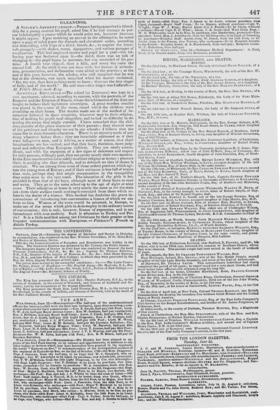GLEANINGS.
A SINGER'S APPRENT EsniP.—Porpora having conceived a friend- ship for a young castrato his pupil, asked him if he had courage to pur- sue indefatigably a course which be would point out, however tiresome it might appear. Upon receiving an answer in the affirmative, he noted upon a page of ruled paper the diatonic and chromatic scales, ascending and descending, with leaps of a third, fourth, &c., to acquire the inter- vals promptly—with shakes, turns, appogiature, and various passages of vocalization. This leaf employed master and pupil for a year—the fol- lowing year was bestowed upon it—the third, there was no talk of changing it—the pupil began to murmur, but was reminded of his pro- mise. A fourth year elapsed, then a fifth, and every day came the eternal leaf. At the sixth it was not done with, but lessons of articula- tion, pronunciation, and declamation were added to the practice ; at the end of this year, however, the scholar, who still imagined that he was but at the elements' was much surprised when his master exclaimed, "Go, my son, thou hest nothing more to learn ; thou art the first singer of Italy, and of the world." He said true—this singer was Caffarelli.— M. F etis's Music mark Easy.
AitmENIAN EDucaT to x.—The school (at Erzeroum) was kept in a vast apartment, adorned, according to custom, with the portraits of the Emperor and the Empress of Russia, whom the schismatics of the East are taught to believe their legitimate sovereigns. A great wooden crucifix was placed in the untre of the room, round which the children were crouching on their knees. The master made use of the method of in- struction followed in these countries, whatever may be their religion, that of making his pupils read altogether, and lie had no difficulty in de- tecting the errors they might commit. I have remarked that the chil- dren partake of the grave character of their parents:. they showed none of the petulance and vivacity we see in our schools : I believe that the cause lies in their domestic education. There is no mystery made of any thing whatever before them : they are invariably addressed as if they were full-grown men, and it follows, as a matter of course, that their imaginations are less excited, and that they have, therefore, more judg- ment and reflection than European children. They are rarely contra- dicted, and with the exception of a few signs of deference and respect for their parents, willingly paid, they are pretty nearly their own masters. In the East conversation turns solely on either religion or money : pleasure there is nothing else than debauch, and to debauch no idea of shame is attached. We see among them none of those ardent passions which agi. tate the young men of Europe; and if their existence is less full of events than ours, perhaps they find ample compensation in the tranquillity they enjoy even to the very tomb. The education of the girls is less attended to than that of the boys; although Most of themlearn to read and write. They go to the same school up to the age of eight or nine years. Their education at home is very nearly the same as for the male sex : from their earliest youth nothing is concealed from•them which re- lates to the duties of a woman. This method has doubtless the grave in- convenience of introducing into conversation a licence of which we can form no idea, Women of the town would be ashamed, in Europe, to make use of the terms which girls in Asia employ in the ordinary course of conversation : this is only, however, licence of expression and is not Inconsistent with true modesty. Such is education in Turkey and Per- sia! It is a little modified among the Christians by their greater or less frequent communications with Europeans. ron'ioneee.r. Travels in Asiatic Turkey.


























 Previous page
Previous page